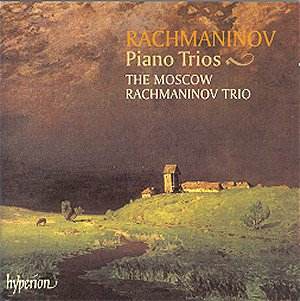Sergei RACHMANINOV
(1873-1943)
Trios élégiaques - No. 1 in G minor (1892); No. 2 in
D minor, Op. 9. Deux Morceaux de Salon, Op. 2. Deux Morceaux de Salon, Op.
6.
 The Moscow Rachmaninov Trio
(Viktor Yampolsky, piano; Makhail Tsinman, violins; Natalia Savinova,
cello).
The Moscow Rachmaninov Trio
(Viktor Yampolsky, piano; Makhail Tsinman, violins; Natalia Savinova,
cello).
 Hyperion CDA67178 [DDD]
[75'10]
Hyperion CDA67178 [DDD]
[75'10]
Crotchet

This disc of early Rachmaninov reveals another, complementary side of a composer
too often perceived as a shamelessly heart-on-sleeve Romantic. That is not
to imply that the whole personality changes: long, yearning melodies are
a clear feature of this world. But so too is an intimacy that occasionally
acts as a gateway to a darker, shadowier place than might be expected from
this composer.
The first Trio élégaique is a much slighter piece than
its Op. 9 brother. It introduces the sweet-toned violin of Tsinman and the
emotional cello playing of Savinova, and acts mainly as a preparation for
the compositionally vituosic second trio.
The Op. 6 Trio was begun on the evening of Tchaikovsky's death and the distraught
first movement is overpowering in its emotional weight. Light begins to filter
through in the second movement (aided by Yampolsky's sparkling fingerwork)
and in this performance the risoluto final movement fully lives up
to its marking.
The pieces for violin and piano (Op. 6, 1893) and cello and piano (Op. 2,
1892) act as delightful interludes between the two trios (they are not even
mentioned on the CD cover). Both Yamposky and Savinova enjoy their moments
in the spotlight, the cellist colouring his account of the Danse
orientale most affectingly. The second violin piece, Danse
hongroise, is ideal encore material and is given plenty of life here.
Strangely, the recording balance (otherwise well thought-out) becomes
disconcertingly close all of a sudden.
An enjoyable disc, well worth exploring and which eclipses the Bekova Sisters
on Chandos (CHAN9329, offering only the Trios).
Reviewer
Colin Clarke
Performance

Recording

